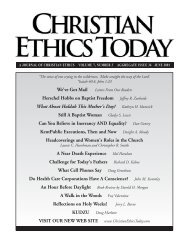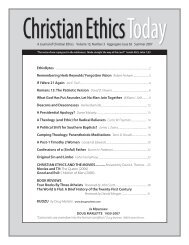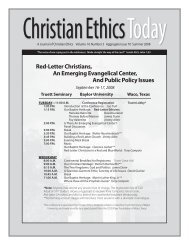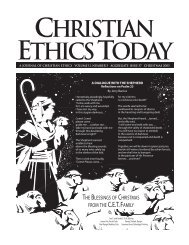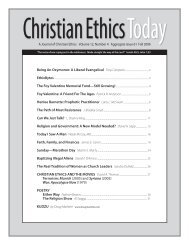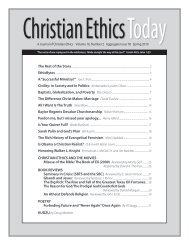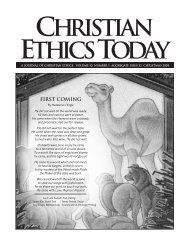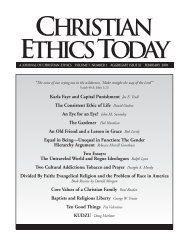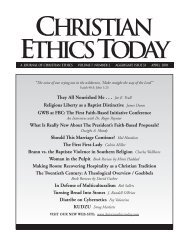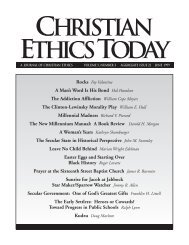Issue 048 PDF Version - Christian Ethics Today
Issue 048 PDF Version - Christian Ethics Today
Issue 048 PDF Version - Christian Ethics Today
You also want an ePaper? Increase the reach of your titles
YUMPU automatically turns print PDFs into web optimized ePapers that Google loves.
and let us devise plans against Jeremiah. Surely the law is not<br />
going to be lost to the priest, nor counsel to the sage, nor the<br />
divine word to the prophet! Come and let us strike at him<br />
with our tongue, and let us give no heed to any of his words’”<br />
(18:18).<br />
Brothers, cousins, uncles, neighbors, village elders, priests,<br />
wise men, prophets, princes, officers, rulers, kings—all saw<br />
Jeremiah as a threat; all did what they could to circumvent<br />
his impact on Judah. While the intent was common, the<br />
strategies were various. There was whispering, mockery, and<br />
derision. There were plots, traps, and accusations. Their<br />
devices ranged from ostracization to threats on his life. The<br />
hostility was total: “Every one curses me” (15:10). The<br />
onslaught was comprehensive: the phrases “everyone” and<br />
“all day long,” name the parameters of his conflict (20:7). I<br />
am reminded of an old blues tune: “Nobody loves me but my<br />
mamma, and she might be jivin’ too.”<br />
What accounts for this antagonism? The explanation is<br />
simple as far as Jeremiah was concerned: “For me the word of<br />
the LORD has resulted in reproach and derision all day long<br />
(20:8). The men of Anathoth confirm the connection: “Do<br />
not prophesy in the name of the LORD that you might not<br />
die at our hand” (11:21). What word did Jeremiah speak that<br />
evoked such a response? A brief description of features of<br />
contemporary American <strong>Christian</strong>ity might provide a window<br />
into circumstances addressed by Jeremiah.<br />
In their recent work, Heal Thyself, Joel Shuman and Keith<br />
Meador discuss what they say is the distortion of the<br />
<strong>Christian</strong> faith into a device for personal benefit. 5 <strong>Christian</strong><br />
faith is recommended, not because it is true, but because<br />
when practiced surgery recovery accelerates, cancer remission<br />
rates improve, and life expectancy increases. In this environment<br />
<strong>Christian</strong>ity has absorbed features of a wider cultural<br />
context characteristic of late modernity: radical individualism,<br />
narcissism, and the therapeutic quest.<br />
I suggest that this account of contemporary American<br />
sheds light on the conflict between Jeremiah and his contemporaries.<br />
The breakdown of the social demands of the<br />
covenant between God and Israel illustrates the rampant<br />
individualism of Jeremiah’s day. The prophet searched the<br />
streets of Jerusalem in vain in his attempts to find one person<br />
doing justice. Instead, he discovers a dysfunctional society in<br />
which the wealthy live by deceit and enjoy their advantage at<br />
the expense of the vulnerable (chapter 5). In his Temple sermon<br />
he calls for self-satisfied worshipers to “practice justice<br />
between a man and his neighbor” (7:5) and warns that<br />
oppression of the alien, the orphan, the widow will eventually<br />
bring ruin on the house called by God’s name (7:6-11).<br />
The fragmentation of social relations can be seen in the violation<br />
of the basic social demands of the Law of Moses. Temple<br />
devotees “steal, murder, and commit adultery, and swear<br />
falsely” (7:9), all the while confident that the Temple serves as<br />
a prophylactic against any disaster.<br />
The admission of 18:12 provides almost a classic expression<br />
of narcissism: “It is no use!” the people of Jerusalem will<br />
say to Jeremiah, “For we are going to follow our own plans,<br />
20 • FEBRUARY 2004 • CHRISTIAN ETHICS TODAY<br />
and each of us will act according to the stubbornness of his<br />
evil heart.” Parallels between 18:12 and 18:18 suggest that<br />
the plans of evil hearts and the plans of priests, sages, and<br />
prophets to silence Jeremiah reveal a relationship between the<br />
pursuit of unbridled self-interest and a religious, institutional<br />
framework that provided ideological support. J. David Pleins<br />
relates social decay and corrupt religious practices, arguing<br />
that at the heart of Jeremiah’s “prophetic critique stood fierce<br />
opposition to the cherished beliefs and ritual practices that<br />
functioned to support the exploitative lifestyle of the urban<br />
establishment.” 6 As in our own day an individualistic, narcissistic<br />
lifestyle sanctioned by a religion of self-fulfillment<br />
threatened the calling and task of the people of God.<br />
Jeremiah’s calling was to confront such a state of affairs with<br />
the word of judgment.<br />
Matters were not helped by the apparent lack of fulfillment<br />
of Jeremiah’s threats of judgment. Decades passed between his<br />
initial warnings of divine judgment and eventual fulfillment<br />
in the destruction of Jerusalem and Babylonian exile. His<br />
antagonists delighted in taunting Jeremiah on the issue of his<br />
credibility (17:15; 20:7, 10). Given the test for the validity of<br />
a prophet and its prescription for false prophets (Deut.<br />
18:20-22), challenges to Jeremiah’s credibility were tantamount<br />
to threats on his life.<br />
Jeremiah confronted the moral decay of the covenant people.<br />
He insisted their worship had been compromised. He<br />
challenged the corruption of the guardians of the religious<br />
status quo. He threatened a judgment that seemed to be only<br />
a phantom menace. And he has to ask, “Why is my pain<br />
unceasing and my wound incurable?”<br />
But this is not the whole story and his anguished questions<br />
require fairer treatment. Yes, he is surrounded by threats on<br />
every side. The social dimension of lament comes through<br />
loud and clear. But it is the theological dimension that is really<br />
the great source of confusion and crisis for the prophet.<br />
Jeremiah’s bigger problem is with God.<br />
Certainly Jeremiah’s God is the God to whom Israel prays,<br />
whom Israel is to serve and worship, and before whom Israel<br />
lives. Jeremiah makes use of the lament form from Israel’s<br />
common worship, and in doing so voices basic convictions<br />
maintained by Israel concerning the character of God. God is<br />
“Yahweh of hosts, who judges righteously” and the one who<br />
“tries the mind and heart” (11:20). God knows and evaluates<br />
the intent of every heart in light of God’s own standards of<br />
righteousness and exercises divine sovereignty in upholding<br />
that righteousness (20:12). Jeremiah believes God hears<br />
prayers, promises deliverance, and is the defender and champion<br />
of those who rely on him in trust (11:18; 15:20; 20:11).<br />
These convictions reflect many of the traditional beliefs of<br />
Israel as expressed in the Psalms of Lament.<br />
Jeremiah also believes he has a peculiar relationship with<br />
God as God’s prophet. God reveals crucial information to<br />
him about enemies (11:18, 21-23). Yes, God knows and tries<br />
every mind and heart, but Jeremiah prays specifically, “Thou<br />
knowest me, O LORD, and Thou seest me; and Thou dost<br />
examine my heart toward Thee” (12:3). Jeremiah has known



